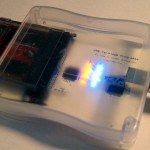

There is different kind of tracker on linux, if you want to use a desktoo/laptop.įor me there is tracker which has one sound engine at a time : I use Linux as well as Windows, so i'm quite open to all suggestions.
#SUNVOX SNES FULL#
Lastly, when it comes to trackers, what would you guys recommend? Is renoise a good choice? does it offer support for multiple chipsets and platforms? nes, amiga, atari, gameboy, etc? It seems like a modern daw/tracker that still stayed true to its roots and even allows the user full control via the keyboard which I thought was great. (surely i'm not the only one with this habit?) lol I've always had a hoarder mentality whenever it comes to hobbies, so if this was the case, I would probably just ended up spending most of my time trying to collect as much sounds as possible instead of focusing on actually making music. I guess my main question is, when using a tracker and producing chiptunes, are all the sounds at our disposal? or do we have to personally acquire and build up our collections of sounds from samples, etc? This is my primary concern. In addition, how does it actually work? Let's say we're talking about the Amiga chip, does the program assign a command or number to every permutation of sounds that the chip is capable of producing ? or are these sounds actually recorded into samples by people from games overtime and grew as a collection? are there any trackers that are able to utilize sounds from multiple chisets and platforms? But let's say if i'm not hung up on limiting my chip music to a specific chip or hardware, but instead want to be able to use all the sounds from various platforms while making my tunes. Now, about trackers, I know that some trackers are dedicated to certain chip correct? That there are trackers specifically for making the Amiga sound, the NES sound, the Gameboy sounds, c64 sounds, etc.


#SUNVOX SNES SOFTWARE#
I know that when it comes to creating chipmusic, there's many ways to do it while using a gameboy handheld with LSDj might provide you the luxury to do live performances, on the other hand, using a tracker software can also prove to be very enjoyable as well as it provides a better interface and workflow.Ĭurrently I'm thinking of starting out with a daw or a tracker in order to get my feet wet, and keeping the gameboy + LSDj option open for down the road I'm a programmer as well and very interested in the demoscene, so doing everything via the computer is something I quite enjoy.

If you would like, I'd offer taking over the maintenance of the sunvox package, keep it up to date and see if I can coax Alexander into providing a desktop file in the next release to avoid a fundamental philosophy discussion.As someone who grew up in the Nintendo, Super Nintendo and warez cracktro era, the sound of chiptunes is somewhat of a nostalgia for me. desktop files in packaging guidelines at least. :DĪ cursory glance didn't yield an immediate recommendation reg. I personally appreciate a desktop file in my graphical application packages, and if upstream does not provide one, I generally don't mind the packager adding one. Gendesk -pkgname "$pkgname" -pkgdesc "$pkgdesc" I'd recommend to rename the prepare() function to build(), as you are in fact building rather than preparing at that time, and move the gendesk dependency to makedepends, as it is not a runtime dependency for sunvox in the first place: diff -git a/PKGBUILD b/PKGBUILD home/gyroplast/.cache/pacaur/sunvox/PKGBUILD: line 29: gendesk: command not found Hey there, this PKGBUILD won't necessarily build, as the prepare() function calling gendesk is run before the dependencies are installed, leading to an obvious error in the process: => Starting prepare(). I don't take particular steps to ensure one variant is chosen as a default over the other currently, though, but the plain "Sunvox" seems to win currently by sheer luck, which I'd consider a sane, conservative default. Similar to how you'd choose a music player for OGG files from a list of applications, you can now associate your favorite Sunvox variant with sunvox projects and instrument files, with whatever tools your desktop environment supplies for that task. However, for example, on x86_64 you'll now find desktop entries for Sunvox and Sunvox OpenGL, both set to handle the registered sunvox mime types. The available binaries depend on the architecture, so I may have gotten a little carried away with sed'ing dynamically from a "template", but I think it's still clear of overengineering a solution. To hear your graphics glitch is avoided with the opengl version, and I consider it perfectly reasonable to package desktop files for all binary variants installed by this package.


 0 kommentar(er)
0 kommentar(er)
